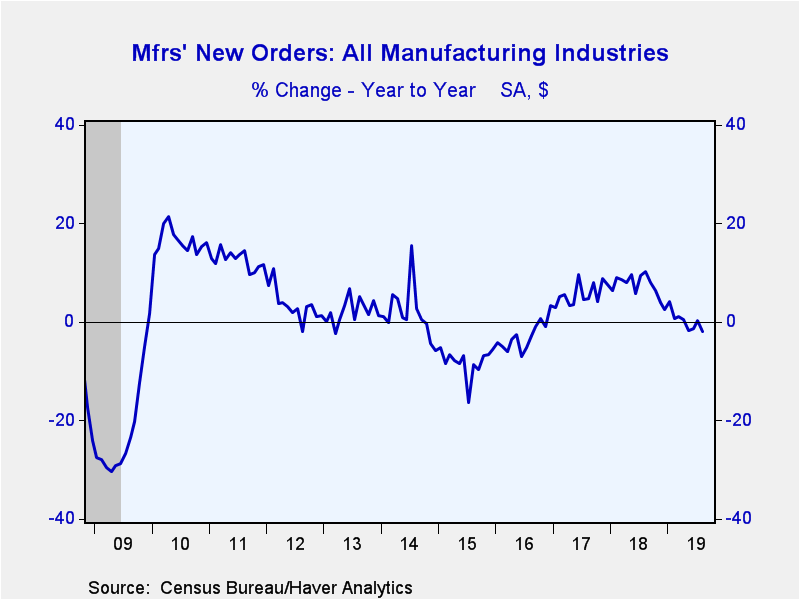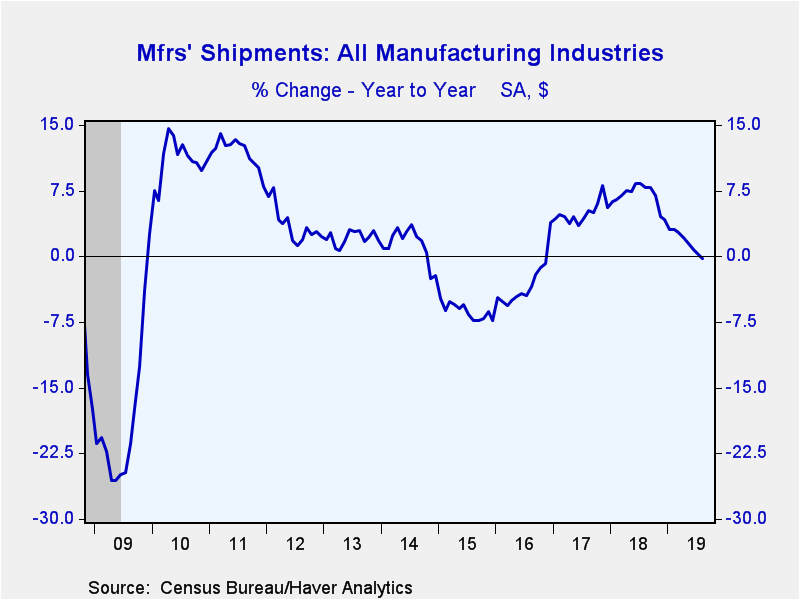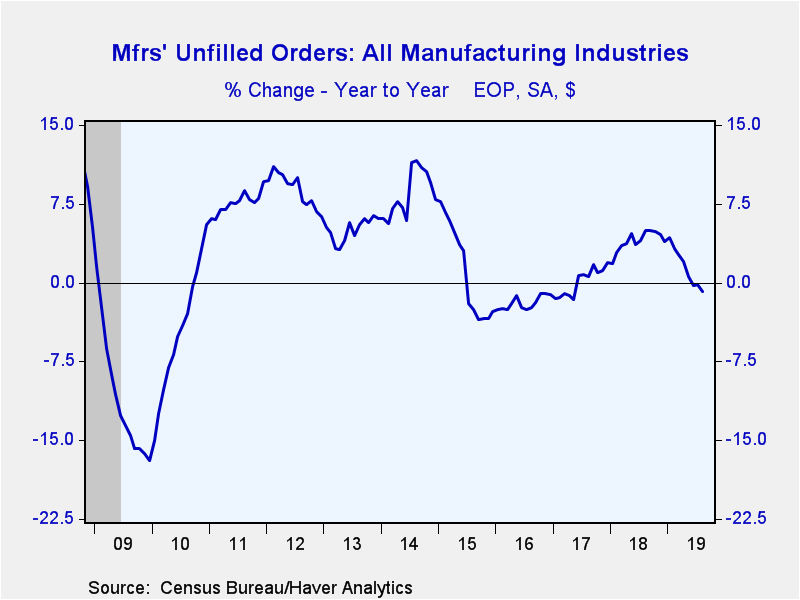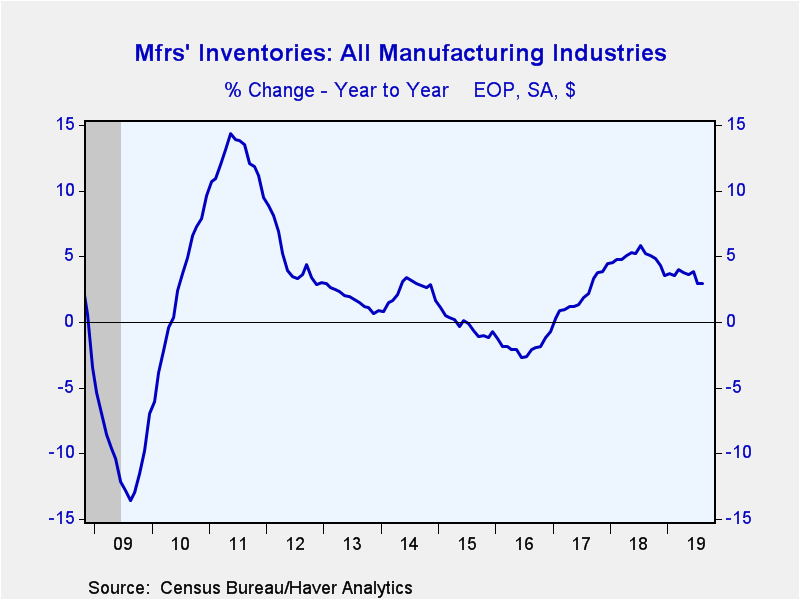 Global| Oct 03 2019
Global| Oct 03 2019U.S. Factory Orders, Shipments & Inventories Ease
by:Tom Moeller
|in:Economy in Brief
Summary
Factory sector activity has been under pressure. Manufacturers' orders slipped 0.1% during August (-1.9% y/y) following an unrevised 1.4% increase during July. The Action Economics Forecast survey expected a 0.5% decline. Durable [...]
Factory sector activity has been under pressure. Manufacturers' orders slipped 0.1% during August (-1.9% y/y) following an unrevised 1.4% increase during July. The Action Economics Forecast survey expected a 0.5% decline. Durable goods orders inched up 0.2% (-3.0% y/y) after a 2.1% increase, unchanged from the advance report. Transportation sector orders eased 0.4% (-8.3% y/y) as nondefense aircraft & parts bookings dropped 17.1%. This decline was countered by a one-third m/m increase (-10.6% y/y) in orders for defense aircraft & parts. Electrical machinery orders dropped 1.7% (+2.8% y/y) but machinery orders improved 0.4% (-1.2% y/y).
Total shipments also eased 0.1% (-0.3% y/y). Shipments of nondurable goods, which equal orders, slipped 0.3% (-0.8% y/y), the third decline in the last four months. The value of shipments from petroleum refineries retreated 4.0% (-10.0% y/y), off for the third month in the last four, due to falling energy product prices. Textile mill shipments eased 0.4% (-3.1% y/y) and apparel shipments slipped 0.3% (-3.6% y/y). Paper product shipments improved 0.2% (0.3% y/y) while food product shipments rose 0.3% (1.2% y/y).
Shipments of durable goods edged 0.1% higher (0.2% y/y) after falling 1.2% in July. Machinery shipments increased 1.6% (1.5% y/y) but electrical equipment shipments were off 0.8% (+2.4% y/y). Transportation sector shipments declined 0.7% (-0.9% y/y) as nondefense aircraft shipments weakened 1.8% (-30.2% y/y). These shipments have been falling steadily for nine months. Shipments of electrical equipment & appliances eased 0.8% (+2.4% y/y) and computer & electronic product shipments slipped 0.4% (+2.1% y/y).
The level of unfilled orders of durable goods edged 0.1% higher (-0.9% y/y) for a second consecutive month. Backlogs in the transportation sector held steady (-1.7% y/y), also for a second straight month. Unfilled orders outside of transportation rose 0.2% (0.9% y/y). Primary metals backlogs jumped 1.3% both m/m and y/y. Unfilled orders of machinery fell 0.5% (-2.7% y/y) while computer & electronic product backlogs rose 0.1% (2.5% y/y) for a fourth straight month. Electronic equipment & appliance unfilled orders increased 0.5% (1.5% y/y) while furniture backlogs rose 0.8% (0.3% y/y).
Inventories in the factory sector remained fairly steady in August, but they strengthened 2.9% y/y. Auto inventories added 0.5% (19.7% y/y) to strong gains in six of the prior seven months. Machinery inventories eased 0.1% (+4.9% y/y) following two straight months of 0.4% increase. Electrical equipment & appliance inventories fell 0.3% (+7.1% y/y), but computer & electronic product inventories were fairly steady. Their 0.5% y/y rate of accumulation was down, however, from a 5.0% peak during all of 2017. Nondurable goods inventories eased 0.5% (-0.3% y/y) as the value of petroleum inventories declined 2.7% (-9.1% y/y). Food products inventories slipped 0.3% (+0.6% y/y). Inventories of textile products fell 1.8% (-0.2% y/y) and basic chemical product inventories eased 0.1% (+0.8% y/y).
The factory sector figures are available in Haver's USECON database. The expectation figure is in the AS1REPNA database.
| Factory Sector (% chg) - NAICS Classification | Aug | Jul | Jun | Aug Y/Y | 2018 | 2017 | 2016 |
|---|---|---|---|---|---|---|---|
| New Orders | -0.1 | 1.4 | 0.5 | -1.9 | 7.3 | 5.7 | -2.9 |
| Shipments | -0.1 | -0.3 | 0.1 | -0.3 | 6.9 | 5.0 | -3.2 |
| Unfilled Orders | 0.1 | 0.1 | -0.6 | -0.9 | 3.9 | 1.9 | -1.1 |
| Inventories | -0.0 | 0.1 | 0.1 | 2.9 | 3.5 | 4.5 | -0.7 |
Tom Moeller
AuthorMore in Author Profile »Prior to joining Haver Analytics in 2000, Mr. Moeller worked as the Economist at Chancellor Capital Management from 1985 to 1999. There, he developed comprehensive economic forecasts and interpreted economic data for equity and fixed income portfolio managers. Also at Chancellor, Mr. Moeller worked as an equity analyst and was responsible for researching and rating companies in the economically sensitive automobile and housing industries for investment in Chancellor’s equity portfolio. Prior to joining Chancellor, Mr. Moeller was an Economist at Citibank from 1979 to 1984. He also analyzed pricing behavior in the metals industry for the Council on Wage and Price Stability in Washington, D.C. In 1999, Mr. Moeller received the award for most accurate forecast from the Forecasters' Club of New York. From 1990 to 1992 he was President of the New York Association for Business Economists. Mr. Moeller earned an M.B.A. in Finance from Fordham University, where he graduated in 1987. He holds a Bachelor of Arts in Economics from George Washington University.










